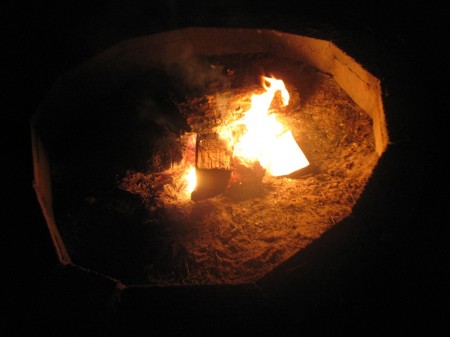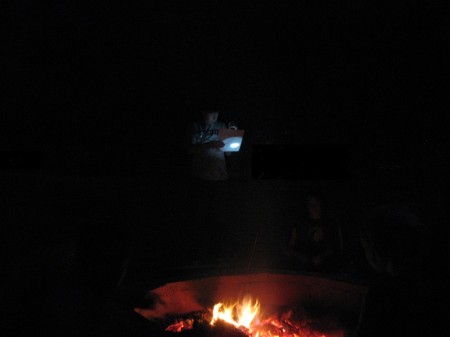1
I decided that we would read our memoirs, the ones my students had been working on for the last five weeks, on our immersion trip down to Mississippi. The idea of sitting around the fire, sharing memories was just too enticing to pass up.
I was a little surprised that no one objected, or even hesitated, when I made the suggestion the week before. We’d just come in from soccer and I was trying to figure out how we’d fit the projects, the tests and the presentations into the time we had left. There was a precedent. They’d read their first stories, the ones from the orientation cycle, on our first immersion and that had worked out well because it had given us an entire afternoon to have a great discussion. They seem actually to look forward to, what’s come to be called, “Teatime with Doctor.”
“What if,” I asked, a little quietly to one of the 8th graders, who’d been on the challenge course immersion the year before and happened to be walking by, “you read your memoirs around the campfire on immersion?”
“Yes.” Declarative and succinct. I raised an eyebrow, but he just continued on his way. I was a little surprised he did not have more to say. I’m always surprised when my students don’t have more to say. My students can be quite loquacious given any opportunity, and this one in particular tended to have strong opinions that he was usually more that willing to share.
The discussion with the rest of the class took barely longer. The larger the group, the more likely you are to have people who need to think out loud, but there were unanimous thumbs up in less than two minutes.
I think that there’s some primal need that gets stirred up by even the thought of sitting around a fire and sharing stories. Of course this plan of action also fulfilled that other fundamental need of the adolescent, the need to procrastinate.
II
We get to Camp H., have lunch, and an afternoon of community building games. Lamplighter’s been working with the camp leader here for years and Ms. A’s impressed by how well this group works together. No surreptitious sabotage, no subtle denigration, no stubborn unwillingness to participate.
We talk about the group, she and I, as we walk back to the cabin, red gravel crunching under our feet, oak leaves turning color overhead, and myself getting slightly out of breath on the last climb. I’m perhaps a little more impressed than she is because I can see the conflict in those by now familiar faces; glimpses of of baser instincts being overruled by the prefrontal cortex. It is a sight that is ambrosia to the middle school teacher.
I get back to our cabin and I find V., one of the two students I’d promised they could get the campfire going.
“Are you guys getting the fire started?” I ask.
“We’re just going to play football for a little while, then start on the fire,” he replies. V’s been our main supervisor for Student Run Business this cycle and it shows. He’s been breaking out his calm, clear, confident, supervisor voice on the challenges all afternoon.
“We have half an hour until dinner and it will probably be dark afterward,” I say.
He just nods, seething competence.
It’s 5:45 and they’re still playing football. I look at my watch more and more frequently. I’m not going to remind them of what they have to do. We’re Montessori after all.
Two of the girls start working on the fire pit. Aha, I think to myself, this is going to get interesting. I saunter outside and my path nonchalantly takes me down to the fire pit. I suggest more kindling, they never get enough kindling. The boys realize other people are working on “their” fire.
Dissension in the ranks. Conflict. I tell them they should work together. Harsh words are spoken. A covenant broken. The poignant cry of impassioned idealism, “injustice”. Things fall apart; the center does not hold; Bethlehem is apparently somewhere on the other side of the playing field.
Ten minutes later it’s time to go to dinner, but first it’s time to rebuild, time to remind them of the covenant they came up with that very afternoon, time to have a short, quiet talk about the use of language.
Over dinner the laughter starts up again. I’m at the other table with Ms. A and her family, all of whom work at the camp in some degree or the other. After the last fifteen minutes I’m extra impressed by the calmness of her teenagers.
When we get back to the fire pit the laughter is perhaps a bit too loud, but the group seems back together again. The fire is started without recrimination (eventually because they did not have enough kindling).
We sit around the fire, reading stories, finding issues, being helpful writing partners, and learning how important it is to be critical, brutal even, to our own work. There are some really good writers in the group, and there’s nothing better than learning from your peers.
“Can we put our memoirs in the fire when we’re done?”
“Sure,” I say. Sharing our writing is supposed to be a celebration. Something strikes me as just about right about liberating these memories in flame, letting them take on a new, ethereal life. Burning pages in dancing flame, marking the putting away of cherished, childhood things; an adolescent rite of passage.
As the last few stragglers work on putting out the fire I sit there, on a cool fall night, thinking about cycles and the seasons. I wish I was on the beach, watching the tide come in, small waves advancing and retreating, bigger waves pushing them farther from time to time, every time a little closer to where they need to be.

